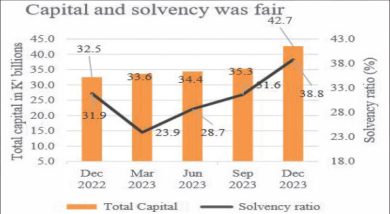UK tells Malawi to be decisive on MSB deal
British High Commissioner Michael Nevin has urged the Malawi Government to be decisive on the proposed disposal of State-owned commercial bank, Malawi Savings Bank (MSB), to maintain the stability of the financial sector.
He said, in an interview in Lilongwe on Friday, that ‘toxic’ loans should be dealt with as part of that process to make the bank viable, but should be done in a transparent manner with no elements of favouritism so that taxpayers should not lose out.
Said Nevin: “Clearly, government has to deal decisively with the sale of MSB because it [puts at] risk the stability of the financial sector. Private businesses are usually better at running private sector institutions especially banks.

He said those who got the bank into this situation should be accountable and that government should not pay loans on their behalf.
“Any claim against government if they are offsetting loans needs to be verified as genuine,” he said.
Nevin’s sentiments come at a time the civil society has given government a 60-day ultimatum not to sell the bank, warning of unspecified actions from Malawians.
The warning by the civil society comes against the background of government taking over MSB’s ‘toxic’ loans worth K6.4 billion (US$14 million) owed by politically connected companies and individuals, which has attracted public anger.
But in a statement released at weekend, government admitted creating the situation that has put MSB in this predicament, saying it used the bank to offer loans and payments, which ended up compromising the professionalism of the bank’s management.
The statement further said it was government’s strong view that the bad portfolio management practices imposed on the bank’s management would arise regardless of the political party in power.
Reads the statement in part: “In particular, each party would exploit the opportunity to abuse the bank on account that it is wholly-owned by the government.
“Political interference in State-owned enterprises is a worldwide reality, which supports the argument for privatisation and divestiture, as advanced by the IMF and World Bank.”
Meanwhile, government is setting up a yet-to-be named independent agency to collect outstanding loans owed to the bank.
Two of the individuals earmarked for the job are Chadwick Mphande, former chief executive officer of Carlsberg Malawi Limited and chartered accountant Nkondola Uka, a managing partner in account, audit and business advisory firm Deloitte.
Earlier this year, government through the Public Private Partnership Commission (PPPC) invited bids from strategic investors to buy its stake in MSB and Indebank Limited.
Through the transactions, government wanted to, among other things, ensure that MSB and Indebank meet new Basel II regulatory requirements in terms of capitalisation.
National Bank of Malawi (NBM) has since been named as the preferred bidder for Indebank while FDH Financial Holdings Limited—the parent company of FDH Bank—was designated as the preferred bidder for MSB, but the deal is facing resistance from several stakeholders, including opposition parties, civil society organisations and more recently concerned MSB employees.





